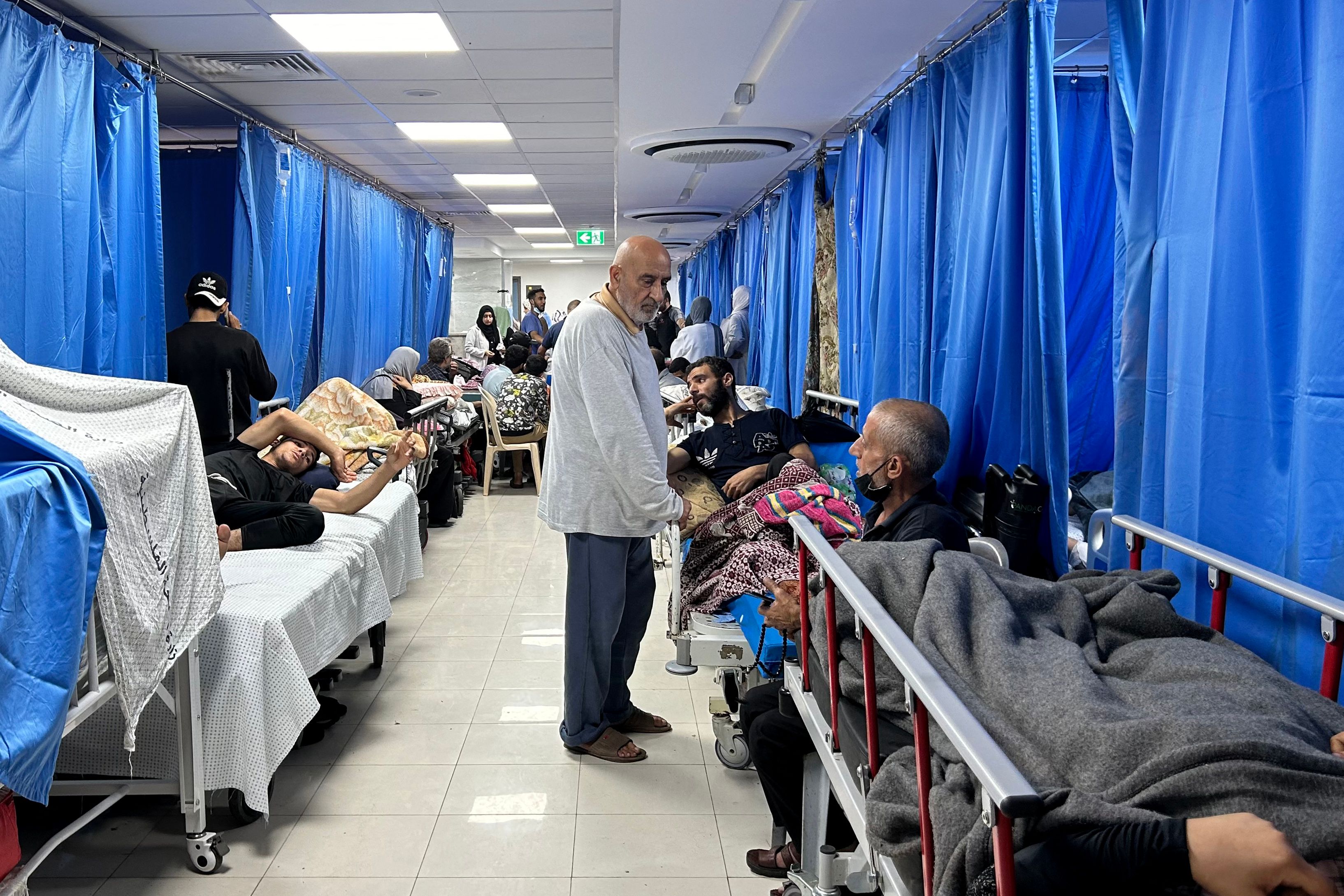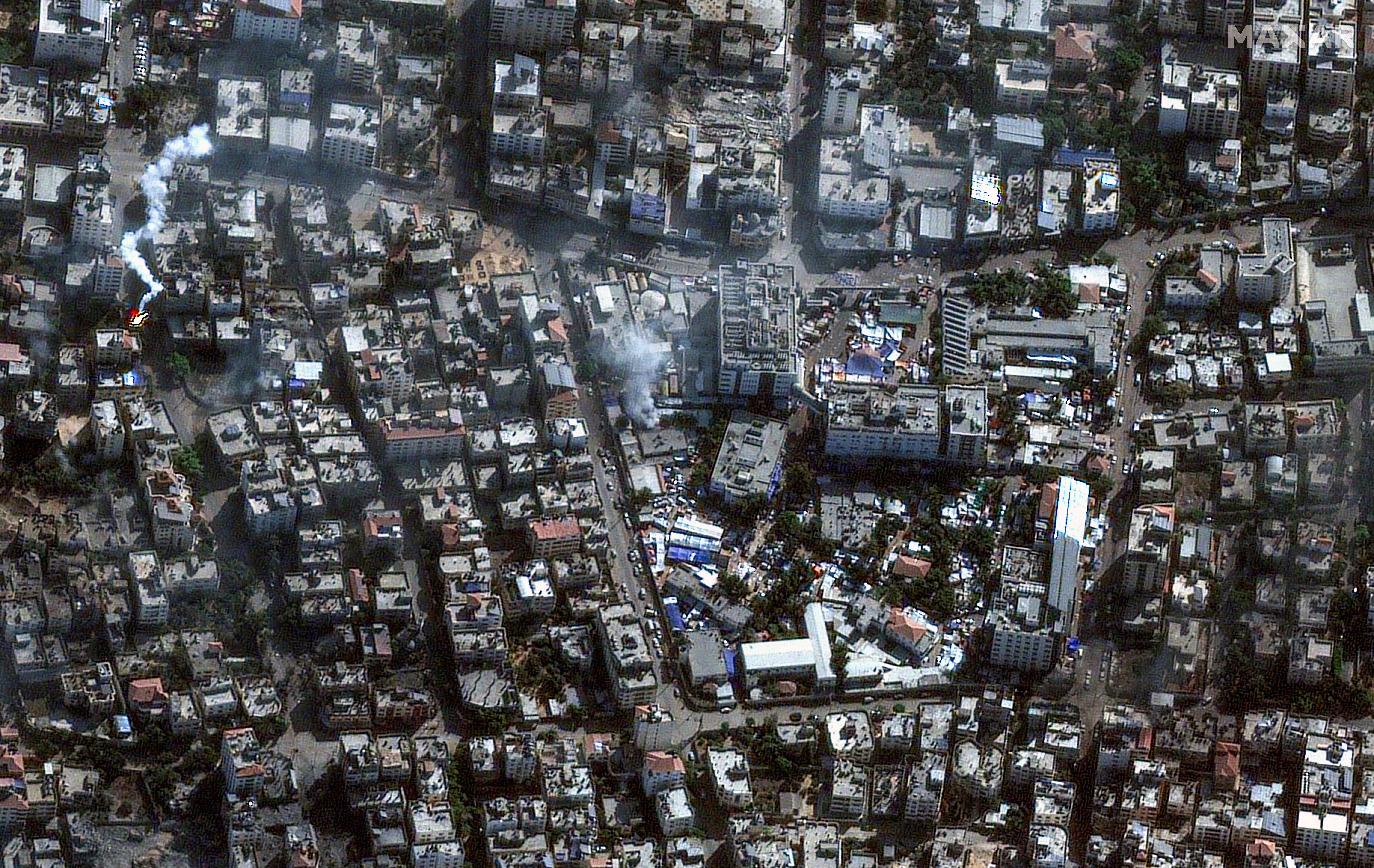Hospitals, hostages and an ever-increasing death toll: the issues that will define Israel’s next steps in Gaza
Intense fighting around major hospitals – where Israel says Hamas have command centres – has upped the pressure on Benjamin Netanyahu’s government from allies, writes Kim Sengupta in Tel Aviv


Israel’s offensive against Hamas is reaching a critical mass with the lethal civilian toll, already the bloodiest by far in the many Gaza wars, becoming a crucial factor in shaping the coming military and diplomatic steps.
Hospitals and hostages are also key issues, both emotive and operational, in what is unfolding. Joe Biden has said that medical facilities must be protected, adding: “My hope and expectation is that there will be less intrusive action relative to hospitals.” His national security adviser, Jake Sullivan, also said: “The position of the United States on this matter is clear. Hospitals should be protected. The United States does not want to see firefights in hospitals where innocent people, patients receiving medical care, are caught in the crossfire.”
But how likely are these strictures to prevail on the ground? The Israeli government has regularly claimed that Hamas uses hospitals in Gaza, including underground tunnels running beneath them, to plan and carry out attacks and have stressed that they needed to neutralise this.
Sullivan seems to have endorsed this himself, when he said: “Without getting into intelligence information, we can just look at open source reporting that Hamas is using hospitals for command and control, for weapons storage, to house its fighters in violation of the rules of war.”
More than 11,250 people have been killed in Gaza since the war started, according to Palestinian health officials, with more than half of them children and women. This amounts to 0.5 per cent of the territory’s population. Some have been killed by airstrikes in the south of the territory, the place where the Israeli government has instructed them to move to keep safe.

Israeli officials say that the US administration have been pressing them privately and publicly to do more to protect civilians, with Washington intimating that they may not be able to give Benjamin Netanyahu’s government the same carte-blanche it had given since it started military action unless this is done.
US officials are warning that the Biden administration is facing increasing criticism from within over its hitherto unconditional backing of the Israeli government. Groups of state department officials have sent dissenting cables. More than a thousand officials from the US Agency for International Development (USAID) have demanded a ceasefire. Dozens of Congressional staffers have pointed out that the administration is not reflecting humanitarian concerns voiced by voters.
More than half of the Democrats in the Senate are asking Mr Biden to press Israel to avoid civilian casualties, clarify what it aims to do in Gaza, and curb violence by settlers against Palestinians in the West Bank.
Disquiet is not limited to America. Ten French ambassadors to countries in the Middle Wast sent a memo to the Elysee Palace regretting Emmanuel Macron’s supposed bias in favour of Israel in the conflict. This is despite the French president being the only major Western leader so far to directly criticise Israeli military action saying there was “no justification” for the bombing of civilians in Gaza, and call for a ceasefire to end the suffering.
In Britain, Rishi Sunak, in his first criticism of Israel, said that the Netanyahu government must act within international law, take all measures to protect civilians, including in Israel, and stop settler aggression in the West Bank. The government announced that it is considering using “air and maritime options” to send more aid – including via its bases in Cyprus.
It is, in the end, US support which is the most important for Israel. The Biden administration has major levers to persuade the Mr Netanyahu government to change its ways, ranging from dropping the veto on UN resolutions to curbing military aid.

It is highly unlikely, however, that Washington will take these steps. And, without that happening, it seems unlikely that Israeli will pay heed to Western demands. President Biden, after all, called for an end to settler violence two weeks ago, with no discernible action resulting from the Israeli government. Instead, a senior cabinet member handed out assault rifles to the settlers.
While violence continues in the West Bank – seven Palestinians were killed in clashes with Israeli security forces at Tulkarem refugee camp on Tuesday morning – immediate international focus remains on Gaza, its hospitals and 239 hostages being held by Hamas.
On hostages, there are signs of progress in negotiations with the prospect of the women and children who have been kidnapped by Hamas being freed in exchange for women and children being held in Israeli prisons. The initial numbers being mooted were for 100 hostages being released in return for 120 detainees from Israeli jails. The figures are being revised, with Hamas reportedly prepared to allow around 70 held to be freed for the time being.
Negotiators say that a ceasefire of around five days would be needed for the swap to take place. This will allow safe passage for Israeli captives, and would also enable international aid to be delivered to Gaza. Brett McGirk, the chief adviser on the Middle East for President Biden, is expected to travel to Israel and Qatar – the main interlocutor on the hostage talks – later this week to try and establish a transfer mechanism.
The Israeli government has said it was against any longer ceasefire than the current four hour daily pause in operations to allow remaining civilians to leave the area of fighting. Asked about the talks, Mr Netanyahu said: “The less I say about it, the more I’ll increase the chances that it will materialise.”
The Israeli prime minister went on to say that previous talk of a ceasefire deal turned out to be “all hokum,” and only continuous military operations would allow hostages to be freed. “It is the one thing that might create a deal, and if a deal is available, we will talk about it, we’ll announce if it’s achievable,” he said.

The families of hostages, many of them critical of Mr Netanyahu and his ministers for the intelligence failure paving the way for the Hamas raid, declared they intended to keep up pressure on the government to bring their loved ones home. They began a 40-mile march on Tuesday from Tel Aviv to the prime minister’s office in Jerusalem.
The subject of hostages has become entwined with hospitals. The IDF released a video purporting to show that the basement of one, al-Rantisi, has been used to keep the kidnapped. Supposed evidence included a chair, curtains, a bathroom a ventilation pipe, a baby’s bottle, diapers and a piece of paper which was said to show a schedule for Hamas fighters on guard duty for the hostages, and a piece of equipment donated by the World Health Organisation (WHO).
The hospital, however, is funded by WHO, and the basement was known to have been used as a bomb shelter with furniture, toilets and bathroom, showers, drapes baby food provided and ventilation pipes needed for those taking refuge there. The “hostage list” appeared to be a calendar with some days and dates, but no names.
The IDF also said weapons had been found at the hospital, although not specifying where, the suggestion being they were under the hospital. A tunnel was found near the hospital next to an apartment where a senior Hamas fighter allegedly lived. It was not claimed that the tunnel reached the hospital.
It remains unclear what will happen with the medical facilities, with the Israeli government insistent that they are Hamas-linked. A mass grave was dug at the main hospital, al-Shifa, on Tuesday for the decomposing bodies of around 180 people, including children, according to the director, Muhammad Abu Salmiya.
The patients died, according to Mr Salmiyah, due to vital hospital equipment failing due to power cuts caused by lack of fuel for generators. He said other patients, including babies, may die in the coming days.
The Israeli military said it had “delivered 300 litres of fuel to al-Shifa's doorstep, yet the fuel remains untouched after Hamas threatened hospital staff”.
The amount of fuel on offer would only keep the generators going for half an hour, said the Palestinian health ministry. Nasser Bolbol, the head of al-Shifa’s neonatal unit, said that the Israelis left the fuel “half a kilometre” away from the hospital, in a combat zone, and did not guarantee the safety of those trying to retrieve it. Medhat Abbas, a spokesman for the Gaza health ministry, maintained that the Israeli military had been requested to work with the Red Cross in transporting the fuel the remaining distance to the hospital, but refused to do so.
The BBC reported that no one was being allowed to leave Shifa for the last 48 hours. Four people who tried to do so, it was claimed, were shot in the legs and left on the ground bleeding for over two hours before medics, risking their own lives, got them into the building. The claim of the shooting could not be immediately verified.
The Israeli military has said it is not targeting al-Shifa, but fierce clashes were taking place all around the hospital. The military has reiterated that Hamas uses the building for its operations.
With every day that passes, as accusations and recriminations are ratcheted up by both sides, the feared scenario of firefights taking place in hospital wards appears to draw closer in this ferocious war.






Join our commenting forum
Join thought-provoking conversations, follow other Independent readers and see their replies
Comments